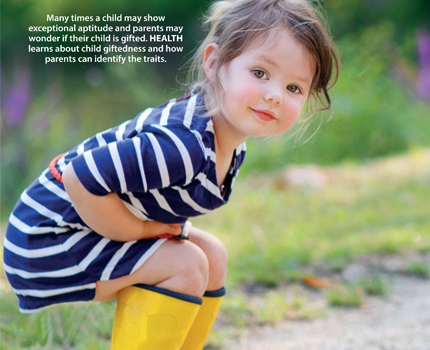 Many times a child may show exceptional aptitude and parents may wonder if their child is gifted. HEALTH learns about child giftedness and how parents can identify the traits.
Many times a child may show exceptional aptitude and parents may wonder if their child is gifted. HEALTH learns about child giftedness and how parents can identify the traits.
What It Means
According to experts, the concept of giftedness, intelligence and talent are fluid concepts and may look different in different contexts and cultures. Often it is characterized by an overall ability to apply the information perceived and skills to different and appropriate situations. The National Association for Gifted Children (NAGC) offers the following definition: “Gifted individuals are those who demonstrate outstanding levels of aptitude (defined as an exceptional ability to reason and learn) or competence (documented performance or achievement in top 10 percent or rarer) in one or more domains. Domains include any structured area of activity with its own symbol system, mathematics, music, language and/or set of
sensorimotor skills, painting, dance, sports.”
Signs of Giftedness
The following are typical factors stressed by educational authorities as being indicative of giftedness. Remember very rarely does a child manifest all of the below attributes described by researchers.
- Shows superior reasoning powers and marked ability to handle ideas; has outstanding problem-solving ability.
- Shows persistent intellectual curiosity and asks searching questions.
- Has a wide range of interests.
- Is markedly superior in quality and quantity of written and/or spoken vocabulary; is interested in the subtleties of words and their uses.
- Reads avidly.
- Learns quickly and easily and retains what is learned.
- Shows insight into arithmetical problems and grasps mathematical concepts readily.
- Shows creative ability or imaginative expression in such things as music, art, dance and drama.
- Sets realistically high standards for himself/herself.
Parenting These Children
Quite often, when one child in the family is gifted, it is quite possible that others may also be gifted. Early identification, between ages 3 to 8 years is favourable for children and helps foster early intervention, very important for gifted children. Parents of gifted children need to listen to their children and allow them to decide what their interests are. In the early years, parents can help their children discover their personal interests, expose their children to their own interests and encourage their children to learn about a wide variety of subjects such as art, nature, music, museums, and sports.
Home stimulation and support of interests is vital to the development of talents.

